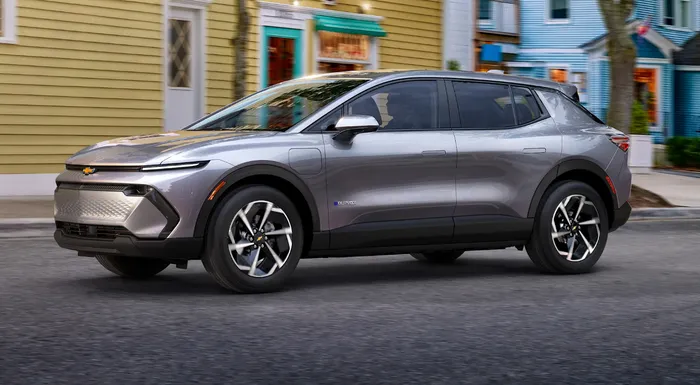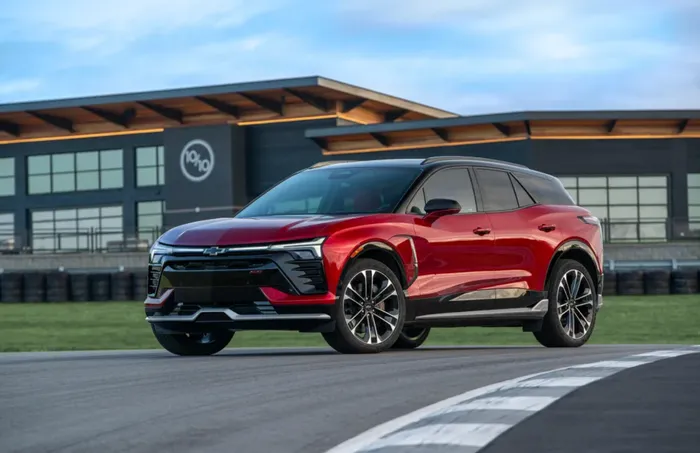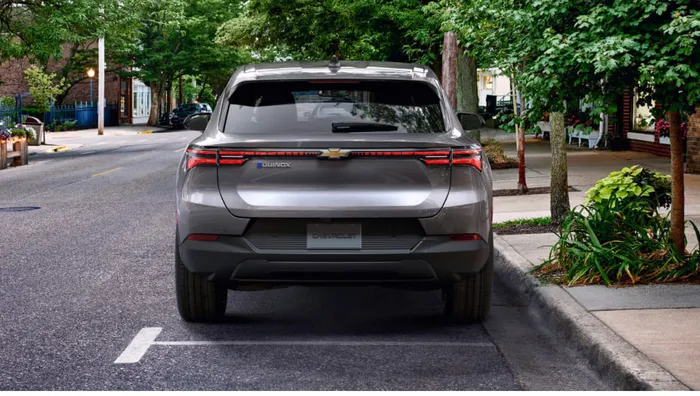
2025 Equinox EV
Image: Chevrolet
General Motors, the largest automaker in the U.S., announced its second-quarter financial results on July 22. The report was, overall, a gloomy tale of the impact of President Trump’s tariffs, which, the company said, cost it more than a billion dollars this past quarter. But while GM’s total profits fell by more than a third in Q2, the company did point out one bright spot: a major spike in EV sales, launching it closer to true competition with Tesla.
In its investor relations call, GM—which operates the subsidiary brands Buick, GMC, Chevrolet, and Cadillac—said its EV sales more than doubled from April to June. Meanwhile, early this month, Tesla reported a 13% decline in vehicle deliveries for its second quarter, one of the largest quarterly declines in the company’s history and its second quarterly decline in a row. In its earnings call on July 24, the company reported its revenue was down more than $3 billion year-over-year (though the company also claimed a newer, cheaper version of the Model Y would soon be available).
An analysis by the data collection firm Cox Automotive published on July 14 found that while Tesla still solidly holds the title of the U.S. EV market’s largest mover, GM has charged past Ford and Hyundai to snag the No. 2 spot. With models like the Chevy Blazer and Chevy Equinox, the automaker is quietly encroaching on Tesla’s dominant market spot.

2025 Blazer EV
Image: Chevrolet
Tesla has long outpaced its competitors in the American EV market, but the gulf that once separated the brand from all others has been slowly closing over the past several years.
In 2020, Tesla controlled nearly 80% of the U.S. market, based on data from Experian. By 2022, that was down to 65.4%, followed by 55% in 2023. This year, per Cox Automotive, that share continues to decline, hovering around 45% as of July 11.
In a press release, Cox Automotive stated, “Tesla’s many issues do not require a full rehashing here: Suffice it to say, the hyper-competitive EV market is providing the troubled automaker no relief.”
Part of Tesla’s market share decline can certainly be attributed to the brand’s laundry list of reputational blows this year, namely concerning CEO Elon Musk’s ongoing feud with Trump. But as Cox Automotive hints, another factor is broadening competition: Since 2020, Ford, Honda, Hyundai, Kia, Lexus, and other automakers have introduced countless new EV models.
GM, in particular, has been dedicating greater resources to its fleet of electric vehicles. The company now sells 12 different EV models across its four brands, which accounted for about 15% of the U.S. EV market in the second quarter of 2025—triple the share of both Ford and Hyundai. Of GM’s EVs, its top-selling models were the Chevy Equinox and Chevy Blazer, which sold 17,420 units and 6,549 units, respectively. The Equinox has gained significant traction for its relatively low cost, which starts at around $35,000.
These numbers are far behind those of Tesla’s ultra-popular Model Y, which shipped 86,120 units in the second quarter. Still, Chevrolet’s EV sales alone have shown 130%-plus year-over-year growth—signaling that GM may be on an upward trajectory compared to Tesla’s current slump.
GM CEO Mary Barra reinforced that trajectory on a July 22 earnings call, sharing that profitable EV sales are now the company’s “North Star.”
“We are growing in EVs because we have a strategic portfolio of vehicles that people love for their design, performance, range, and value,” she said.

.
Image: Chevrolet
Despite GM’s major EV success of late, the new EV market saw an overall year-over-year decline. Stephanie Valdez Streaty, senior analyst at Cox Automotive, said in its press release that the lower sales “underscore the market’s ongoing challenges, as growth in the auto business ebbs and flows on consumer demand,” and are a sign of a more mature EV market.
Used EV sales, on the other hand, quietly flourished, surpassing a record-breaking 100,000 units in the second quarter. “With availability growing and incentives for new EVs expected to fall, the used EV market may grow faster in the quarters ahead,” Cox Automotive reported.
For market analysts, the elephant in the room is Congress’s recent approval of new spending legislation that will end tax credits on new or used EVs beginning September 30. In light of this change, several experts have predicted that EV sales are likely to see a spike in the interim, followed by a noticeable decline starting in October.
Cox Automotive takes a slightly more conservative stance, predicting that new EV sales will continue to expand in the U.S. compared to last year, but at a much reduced pace.
“With government-backed incentives set to end in September and economic pressures mounting, the second half of the year will be a critical test of EV demand,” Valdez Streaty said. “Q3 will likely be a record, followed by a collapse in Q4, as the electric vehicle market adjusts to its new reality.”
ABOUT THE AUTHOR
Grace Snelling is an editorial assistant for Fast Company with a focus on product design, branding, art, and all things Gen Z.
